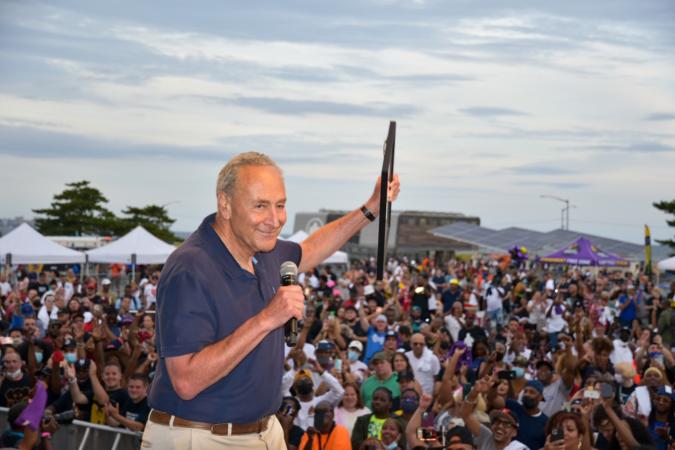Fifty-five years after its inception, the 1969 Harlem Cultural Festival was finally recognized by Congress. The U.S. Senate agreed by “unanimous consent” on a resolution that acknowledges the festival and the 1970 New Orleans Jazz and Heritage Festival.
The resolution was sponsored by Senate Majority Leader Chuck Schumer. It states that the last weekend of June 2022 will “commemorate the first weekend of the 1969 Harlem Cultural Festival,” with the Senate recognizing that the festival represented “a shift in Black culture, consciousness, and expression.”
The festival, which ran for six weeks the same summer as Woodstock, kicked off on June 29, and was the subject of the documentary that swept the nation, Questlove’s Summer of Soul. The Oscar- and Grammy-winning film looked at the festival and how unknown it is in history, forgotten by the masses for decades.
According to Rolling Stone, the festival was the brainchild of Tony Lawrence, a local entertainer who was hired by the New York City Parks department in 1967 to organize summer events in Harlem. Held in Harlem’s Mount Morris Park (now known as Marcus Garvey Park), the festival celebrating Blackness, featuring free events that celebrated Black people and highlighted Black music.
Over the next few summers, the festival grew exponentially. Great artists like Count Basie, Bobby “Blue” Bland, Tito Puente and Mahalia Jackson performed to tens of thousands of festivalgoers. Soon, white politicians gunning for bigger political opportunities, as well as Black community organizers and civil rights leaders, wanted to make an appearance at the festival. It was official — the Harlem Cultural Festival was a force to be reckoned with.
In the wake of Martin Luther King Jr.’s assassination, the community needed the festival more than ever. Lawrence hustled to get the funding and support needed to make the 1969 festival bigger than ever. More than 300,000 people showed up, and some of the greatest entertainers of all time, including Stevie Wonder, Nina Simone, B.B. King and many, many more, graced the stage. The Black Panthers even provided security for the event, History reports.
“’69 was a pivotal time period for a lot of Black people in the country to have self-pride and self-love,” Questlove explained on a call discussing the Senate resolution. “That was a new concept to them.”
Schumer was also present on the call, and when he asked how folks learned of the festival, Summer of Soul producer Joseph Patel explained that information was spread the old-fashioned way.
“Mostly in Harlem, word of mouth, local radio,” he said. “Some people from other boroughs showed up, but really it was put on for the community and sort of kept within the community.”
David Dinerstein, another producer on the film, echoed Patel’s explanation. Dinerstein also noted that the festival didn’t get the coverage it deserved.
“Unfortunately, the media didn’t really pay much attention. It got very little coverage both on the promotion side and the review side after the fact,” he explained.
Questlove shared his shock at the Senate’s recognition on social media.
“WHOA!” He wrote, probably realizing the influence Summer of Soul had on Congress.
The resolution takes it a step further, encouraging collaborations between the U.S. government and Black artists, Rolling Stone reports.
It “encourages Senators to plan appropriate activities that support the objectives of the [festivals]” and “encourages local governments in the United States to build partnerships with local Black artists, performers, and activists to further uplift Black culture and art and promote equal treatment of all people.”

